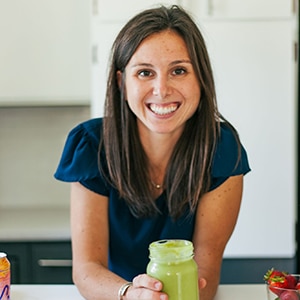



Probiotics are living microorganisms that may offer health benefits when consumed in sufficient quantities.
You’ve likely heard the term ‘probiotics’ and may even know they offer health benefits. But you may still have a few questions, such as – what exactly are the health benefits of probiotics? Can I get sufficient quantities from food or do I need to supplement? Or are there any dairy-free or vegan probiotics?
Below I’ll dig a little deeper into the world of probiotics and answer your most pressing probiotic questions.
Let’s start from the beginning with a simple definition.
What Are Probiotics?
The internationally endorsed definition of probiotics is live microorganisms that, when administered in adequate amounts, confer a health benefit on the host. (1)
Our bodies contain trillions of microorganisms. These play a role in digestion, immune system health, and even produce certain vitamins. It’s easy to think of them as either good or bad, but they each play a function and when in balance – are involved in a variety of processes that help our bodies function optimally.
The ratio of good to bad bacteria in our gut can become imbalanced due to a variety of conditions including the use of antibiotics or other medications, poor diet, illness, or stress. Probiotics can help improve your gut health, and research now shows a link between gut health and many other aspects of health (2, 3).
Health Benefits of Probiotics
Different strains of probiotics have varying roles and offer a variety of health benefits. So what are probiotics good for?
Research has shown that probiotics may help to:
Whole Food Probiotics
The most well-known probiotic food is dairy yogurt. But did you know that the cultures don’t occur naturally but are added to both dairy and non-dairy yogurt?
To make yogurt, either dairy or non-dairy, manufacturers add a starter culture to a liquid to begin the fermentation. This yields a tangy taste and beneficial bacteria (probiotics). After fermentation, some yogurts may be heat treated. In this case, the heat process kills many of the live and active cultures, so some manufacturers add back probiotics.
Just like dairy yogurt, read the label of your favorite dairy-free yogurt to make sure it lists Live & Active Cultures in the ingredients. All varieties of Forager Project plant-based yogurt foods contain live and active cultures (probiotics).
For other dairy-free probiotics, try:
What is the Difference Between Probiotics and Prebiotics?
Probiotics are live bacteria that that may provide health benefits (as described above) Prebiotics are not living organisms. They support the growth and survival of the good bacteria in your gut. Don’t look at it as Prebiotics vs Probiotics because prebiotics feed the probiotics.
Prebiotic foods include:
Do You Need Probiotic Supplements or Can You Get Enough Probiotics through Food?
To answer this question, it would be best to ask your doctor or registered dietitian as each individual’s needs are different. Depending on your own dietary needs or health conditions, your healthcare professional may recommend consuming more or less probiotics.
There are currently no set guidelines on probiotic consumption like there are for other nutrients. We do know that consuming whole food sources of probiotics has its benefits (see above!).
Ask your doctor or dietitian for customized recommendations if you are considering supplementation. Remember, supplements are not as tightly regulated as medications and it is important to consult your doctor or dietitian before starting a supplement routine. They will be able to provide you with customized recommendations on dosage, brand, and more if supplementation is appropriate for you.
Summary
Probiotics are live microorganisms that support a healthy gut and may have other health benefits as well (1). Aim to consume foods that naturally contain probiotics daily. You can find dairy-free probiotics in non-dairy yogurt, fermented vegetables, tempeh, and more. Consume prebiotics to feed the probiotics and support good gut health.
Thank you to Jenna Gorham for compiling this helpful guide on probiotics!
Sources:

Jenna is a registered dietitian nutritionist who believes healthy eating should be simple, delicious, and fun.